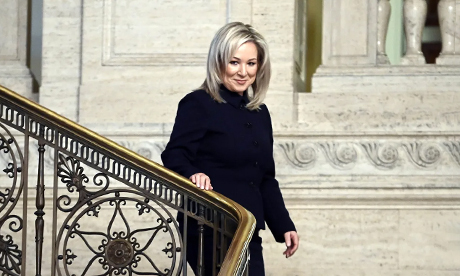Northern Ireland, known for its entrenched Protestant majority, saw a monumental shift as Sinn Féin’s Michelle O’Neill secured the necessary cross-community votes to become the region’s first Catholic leader.
This marked a significant departure from the past, where leaders openly identified with Protestantism.
In a poignant moment at Stormont Parliament Building, O’Neill, representing the Irish Catholic community, pledged to serve as a leader for all, extending an olive branch to her unionist counterparts.
“To all of you who are British and unionist, your national identity, your cultures, your traditions are important to me. Let’s walk this two-way street together, let’s meet one another halfway. I will be doing so with an open hand and also with heart” O’Neill said.
“This is an assembly for all — Catholic, Protestant and dissenter” O’Neill added. “Despite our different outlooks and views on the future constitutional position, the public rightly demands that we cooperate, deliver and work together.”
Eamon Martin, Archbishop of Armagh and Primate of All Ireland, extended his prayers and blessings to the newly appointed First Minister Michelle O’Neill, Deputy First Minister Emma Little-Pengelly, members of the Northern Ireland Executive, and MLAs.
In his post, Archbishop Martin emphasised the importance of unity and collaboration in addressing the pressing challenges facing families, the impoverished and the vulnerable within society.
Groups threaten stability
O’Neill’s road ahead is fraught with challenges, particularly concerning the presence of paramilitary groups and lingering tensions from past conflicts. Despite progress since the Good Friday Agreement, these groups still threaten stability, undermining reconciliation efforts.
Despite Sinn Féin’s historical association with Irish Catholics, O’Neill and the party are at odds with Church teaching on several issues. For example, Sinn Féin supported the increase in access to abortion, and the party supports children having access to transgender drugs.
The complex dynamics of Northern Ireland’s political landscape, compounded by Brexit-related issues, have hindered the functioning of Stormont.
The collapse of power-sharing arrangements in 2017 and subsequent struggles have highlighted the fragility of the peace process.
The appointment of O’Neill, achieved through painstaking negotiations and agreements, signifies a renewed commitment to governance and stability.
Read More
Additional reading
News category: World.




